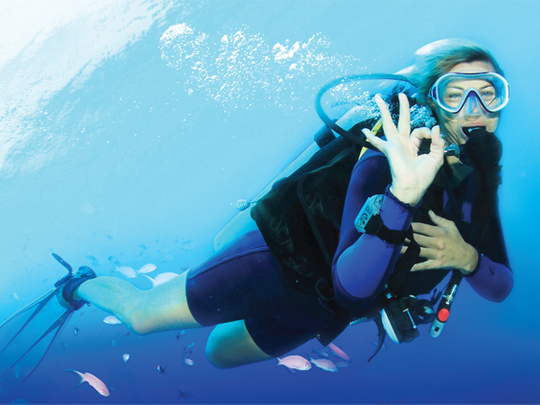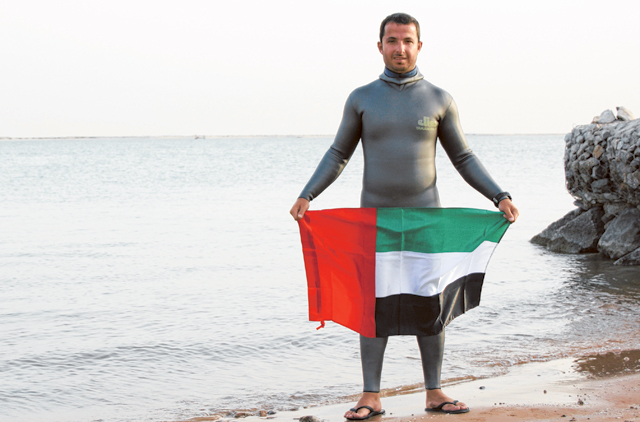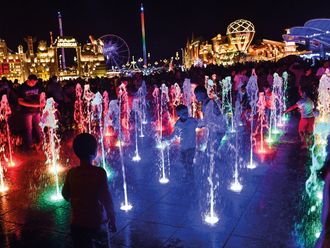
Dubai: The death of Adel Ait Ghezala, an experienced Algerian free diver in UAE waters earlier this month, shocked the UAE community. An able-bodied young man aged 35, he had considerable free diving experience around the world. On New Year’s day, Adel went spearfishing along the UAE coastline. He followed the standard instructions, was accompanied by a diving buddy and yet he disappeared. A week later, on January 11, his body was fished out of the waters. The incident brought back the focus on the safety of diving as a recreational sport. The question on many people’s minds was: Is diving dangerous? Is it meant for everybody?
If you go by statistics, one of the largest training agencies in the world, DAN Diving Fatalities Workshop, based in North Carolina, USA, collected figures on diving safety over a period of 10 years and it turned out that the rate of accidents was only 0.472 fatalities per 100,000 dives. These are not exactly what you would call alarming numbers. “What’s also encouraging about this data is not just diving’s overall low fatality rate, but the fact that this rate has remained consistent or shown improvement over the last decade,” according to the 2010 DAN (Diver Alert Network) Diving Fatalities Workshop report. In this context, diving accidents are not in great numbers.
However, given the tragic death of Ghezala, there are issues that need to be addressed regarding diving and the discipline it requires. But first, let’s look at what diving is all about.
Gulf News spoke to members of the diving community in Dubai — Ebrahim Al Zu’bi, Executive Director of Emirates Diving Association (EDA), champion free diver Ahmad Khoury, president of AIDA (Association Internationale pour le Développement de l’Apnée UAE), and diving physician Dr Barbara Karin Vela. All three experts agree that diving is an excellent sport and one of the most de-stressing pursuits that acquaints you with the underwater world. They believe it should be encouraged in people who have a passion for aquatic sports.
What is diving?
Al Zu’bi defines the sport: “Diving is swimming underwater with or without any breathing apparatus. You can either do a free dive which involves taking a deep breath and diving in holding your breath all along as pearl divers of UAE did decades ago or you can use the Self Contained Underwater Breathing Apparatus (Scuba). Scuba divers use equipment comprising compressed gas, mask, fins and a buoyancy device. The feeling of weightlessness and a three-dimensional awareness of your surroundings is one of the most fascinating experiences.”
Free divers believe not having to carry the equipment on person frees them up to be more in touch with the underwater world as their impressions are not blocked by the scuba equipment. Also, free diving is an international competitive sport whereas scuba diving is not. Anyone can free dive, but to enrol in a free diving course in the UAE, you have to be a minimum 16 years of age.
Speaking on free diving Khoury says: “Free diving is the most natural and serene way to explore the depths of the oceans with minimal impact. It is also the ultimate way to free yourself and spend more time enjoying the beauty and silence of the sea. Anyone who has held his/her breath underwater has free dived. However, free diving is not simply about seeing how long you can hold your breath or how deep you can go on a single breath. You have to create the right attitude and pay attention to the limits of your body and mind. The true appeal of free diving is in the silence and calm it brings to people’s hectic lives.”
Both scuba and free diving are ways to explore the underwater world. Scuba divers usually dive to observe aquatic life and enjoy the aquatic life without hurry, while free divers typically attempt to achieve a depth or dive time, trying to challenge one’s limit, observes Khoury.
The other arguably good point about diving is that it places no age limit on the enthusiast. Generally speaking, anyone over the age of ten can dive. According to Dr Karin Vela, a general physician at the Dubai London Speciality Clinic with a specialisation in Underwater Medicine, “There is no upper age limit in recreational scuba diving and when it comes to children, the lower age limit varies depending on the regulatory and training agency in different countries. There is a common belief that children should not dive deeper than nine metres of sea water until their bones have reached maturity. The lower age limit in USA is 15 years and in Australia, 14 years. Diving physicians recommend only supervised dive experiences for children younger than 16 years to a maximum depth of nine metres.”
While it is not considered important to be a champion swimmer in order to dive, it is expected that scuba divers be skilled enough to be able to swim 200 metres without fins for five minutes, says Dr Karin Vela. Al Zu’bi adds: “The most important thing is for the diver to be comfortable in water. A student diver has to perform a 10-minute float [continuous] swim without a swimming aid and 300 metres of continuous swim with masks, fins and snorkel. So swimming is an important aspect of diving.”
With regard to health and diving, beyond the standard caveat that all forms of sport require you to be medically fit, diving has a special caveat: it is more unpredictable as compared to many sports. “Sea conditions can change within a short period of time and the diver can be exposed to unpredictable and extreme workloads in emergency situations produced by current, tides and changing weather conditions, says Dr Karin Vela. “There are medical contraindications for people with conditions such as epilepsy, diabetes, hypertension and heart diseases.”
Khoury adds: “You must be physically fit to free dive and participate in any free diving course that is recognised by the international free diving association such as Aida. You must complete a medical form that draws attention to any physical condition you may have that can heighten the risk of injury under water. You do not have to be incredibly fit to free dive, but must be comfortable under water, a fairly confident swimmer and have a basic level of fitness.”
Regulating professional diving
While free diving is a risk and an adventure anyone can take, when it comes to taking professional diving courses, the EDA steps in. A voluntary and non-profit organisation formed in 1995, the EDA regulates and legislates diving practices in the UAE, apart from making divers aware of sustainable diving procedures and ocean conservation. It observes strict rules and practices and ensures the quality and professionalism of diving instructors is of international standards. For example, a private diving school or freelance diver cannot get a licence to teach without first getting an EDA membership, which is free, but requires several mandatory sections to be filled out. EDA conducts its own verification of the organisation looking through fatality records and safety regulations. A freelance diving instructor cannot teach diving unless he is associated with one of the recognised diving schools and has a valid resident visa.
Besides that, there is what is called the DAN insurance, an integral part of the diving programme anyone undertakes at a diving school.
Also, prior to the dive, the school or instructor who takes people out for a diving trip, has to give a full safety briefing.
However, despite the regulations in place, the EDA helpline does receive several calls round the clock about diving incidents where divers go through decompression sickness or some injury. This problem is directly related to the general lack of decompression chambers in general hospitals and dedicated diving physicians in the UAE. At present, victims of a diving accident have to be rushed to a military or port hospital.













